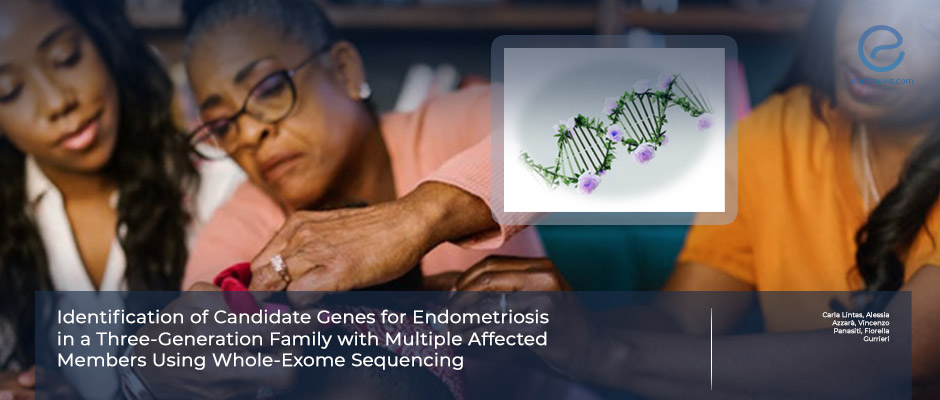Study Points to Polygenic Etiology in Familial Endometriosis
Sep 17, 2025
New Evidence Supports Polygenic Etiology of Endometriosis in Multi-Generational Case Study
Key Points
Highlights:
- A study that identified four generations of women affected by endometriosis suggests a polygenic model for the disease.
Importance:
- A better understanding of the genetic basis of endometriosis can ensure women are diagnosed and treated in a timely manner.
What’s done here:
- Researchers genetically analyzed three sisters and their mother.
Key results:
- 36 co-segregating rare variants were identified
- The LAMB4, EGFL6, NAV3, ADAMTS18, SLIT1, and MLH1 genes could be contributing to the onset of endometriosis.
Limitations:
- The sample size is small and comes from a single family.
- There are no negative controls.
- The findings are not validated at the transcript or protein level, so the functional impact of the variants identified is not known.
From the Editor-in-Chief – EndoNews
"This family-based genetic study offers a rare and fascinating glimpse into the heritable architecture of endometriosis. By examining a four-generation pedigree, the authors highlight that the disease may be polygenic in nature, shaped by the interplay of multiple rare variants rather than a single causative mutation. The identification of candidate genes such as LAMB4, EGFL6, NAV3, ADAMTS18, SLIT1, and MLH1 is particularly intriguing, given their established roles in pathways related to cell growth, extracellular matrix remodeling, and cancer biology.
The strength of this work lies in its use of whole-exome sequencing across related individuals, which provides internal genetic consistency and underscores the power of family-based designs in rare disease research. However, the limitations are clear: this is a small, single-family study without functional validation, and therefore the results remain hypothesis-generating rather than definitive.
Even so, the implications are profound. If endometriosis is indeed polygenic, as this report suggests, the future of research will require integrated genomic approaches across large cohorts to capture the full spectrum of genetic contributions. Such insights may ultimately pave the way for personalized risk prediction, earlier diagnosis, and precision-targeted therapies.
This study is a timely reminder that endometriosis is not a monolithic disease but a biologically diverse condition whose roots extend deep into the genome. By piecing together these genetic puzzles, we move one step closer to unraveling its complex etiology."
Lay Summary
A team of researchers from Italy identified new genes that may be associated with endometriosis.
The team analyzed a multi-generational family affected by the disease. Their findings support a polygenic model of the disease, i.e., a model where more than one gene is involved, the researchers explained
“Our study is an exploratory family-based . . . study, and replication and functional studies are warranted to confirm these preliminary findings,” they wrote in a report that they published in the scientific journal Biomedicines.
To indetify rare genetic variants that may play a role in the development of endometriosis, the team of researchers led by Dr. Fiorella Gurrieri from the Research Unit of Medical Genetics, Department of Medicine, University Campus-Biomedico of Rome and Operative Research Unit of Medical Genetics, Fondazione Policlinico Universitario Campus Bio-Medico in Rome, Italy, studied three sisters, their mother, their grandmother, and one daughter who were all diagnosed with endometriosis.
The team conducted whole-exome sequencing (WES) on the three sisters and their mother.
They identified 36 co-segregating rare variants. They focused their analysis on six variants that they identified in genes associated with cancer growth.
The top candidates were the LAMB4 gene and the EGFL6 gene. They said that variants of the NAV3, ADAMTS18, SLIT1, and MLH1 genes may also contribute to the onset of endometrosis.
“. . . the study represents a valid and valuable effort to identify rare, potentially pathogenic variants through a family-based WES,” the researchers wrote.
Research Source: https://pubmed.ncbi.nlm.nih.gov/40868176/
genetics familial endometriosis

